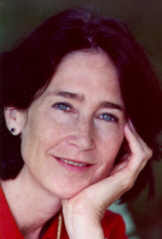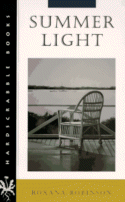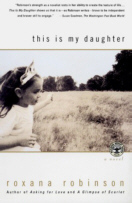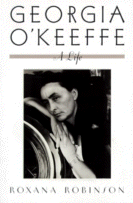Mothers Who Write: Roxana Robinson
by Cheryl Dellasega, PhD
-- from the short story "Daughter" in A Glimpse of Scarlet by Roxana Robinson
Although Roxana Robinson began writing as a child, she obtained her bachelor's degree in art and spent the early years of her career working in a gallery.

|
A resident of New York City, Ms. Robinson has been awarded an NEA Fellowship, a MacDowell Fellowship, and, most recently, was named one of the Year 2000 Guggenheim Fellowship winners. Her work has been selected for The Best American Short Stories several times, and she has taught at several well established writing conferences and workshops (Wesleyan, Bennington, and University of Southern Indiana).
She has one daughter, aged 27.
What inspired you to write?

|
How old were your children when you started to write?
I always wrote, even before having children. After my daughter was born the types of things I wrote about changed because having a child made me very aware of issues I wouldn't have thought about without motherhood. That made for more interesting subject material.
Could you have written the books you have if you weren't a mother?
Before the birth of my daughter, I always wrote short stories, and I had done a "coming of age" novel about a single person. I quickly found that a single person is not as powerful and complex as family. Recently (7/17/00), my essay on "If You Invent the Story, You're the First to See How it Ends" was published in the New York Times. I talk a lot about this subject because I feel so strongly about it. The bonds we have with our families are the strongest ones we ever know, and they stay with us all our lives.
Having a child makes you aware of all this. You examine your connections to people. You reassess your connections to your husband, and are constantly challenged to reconsider who you are in the world. You lose your sense of self-importance because your child is more important than you are. This same process happens when you write a book in that you make a discovery about yourself: who you are as a parent, who you are in this world, and what it means to be a parent in a variety of situations.
From a practical standpoint, how has being a mother affected your writing?

|
As a novelist, I didn't really have deadlines, which meant I didn't have the pressure to make choices between my daughter and writing. By the time I wrote the O'Keeffe book there was a lot of traveling involved and it was also my daughter's last year at home, so that was harder. I felt torn because I didn't want my daughter to leave, but at the same time I was very aware of the constant responsibility of needing to take care of her while she was there.
Are your books like children to you?
To a certain extent, there is a pregnancy phase and gestation of book, and I learn things about myself through them. Unlike my daughter, once one of my books is published I don't want to see it anymore!
Does it make your daughter uncomfortable to have a mother who is a writer?
We're all helpless in front of a writer, especially children. There's no doubt that people do feel betrayed and exposed if they think they see themselves in your writing, but you can't help writing about the things you see around you.
In relation to my daughter, I would always try to change things when I wrote about them in a way that would respect her privacy. Sometimes she would see things in my writing she recognized, and would say things about it. For example, she would recognize the dynamics of a relationship, so I would try to always change that dynamic, make it happen to other characters or alter the details somehow. If my daughter had ever felt uncomfortable with something I wrote, I would omit it, but since I don't write about things that are specific to any individual, that was never an issue. However, she would have veto power.
Are your children in your stories or novels anywhere?

|
Several years ago, I wrote a story called "The Nightmare" about a woman who goes to the house where her boyfriend lives in and his daughter is there. The daughter wakes at night, and wants to sleep with her father. It was very easy for me to extrapolate about what it might feel like to be in a situation where you are both a parent and a sexual person. Since these are two very powerful parts of your personality, woman as lover, and woman as mother, there is a collision. So it was more an understanding of that situation that enabled me to write the story than a real event. Still, it had its basis in the reality of who I was.
Has there ever been something from your child's life you wanted to write about, but didn't for privacy reasons?
Yes, definitely. I didn't write about certain things because they weren't my story, they were my child's story, and I didn't feel it would be fair to use them.
Any other thoughts on how being a mother has influenced you as a writer?
I'm trying to think of other writers who have used their persona as a mother as the focus of their writing, and that makes me realize there aren't many women out there writing about family. Families are such a powerful part of our lives it's a shame more women artists don't focus on it. Somehow, although in this century supposedly no one story or theme is more important, the issues that surround maternity aren't seen as significant as the issues that confront men.
How did your own mother influence you as a writer -- if at all?
My mother was a writer, too. She wrote columns for the local newspaper, and a novel that never got published. Her father was also a writer, an attorney who wrote a column for the Philadelphia papers, as well as a series of adventure stories. So writing was a part of my family life, and my mother was always very supportive of my writing. My brother is a journalist in Los Angeles, and my daughter is a wonderful writer, but is focusing on art.
**Cheryl Dellasega, Ph.D., is a mother, wife, writer, and Associate Professor of Medicine at Penn State University in Hershey, PA. Her book, Surviving Ophelia, will be published in Fall 2001 by Perseus Publishing. She can be reached by email at cdellasega@aol.com.
More from Writers Write
Stephen King Quotes
quotes from the master
quotes from the master
Grammar Tips
improve your writing
improve your writing
Writing Prompts
spark your creativity
spark your creativity
